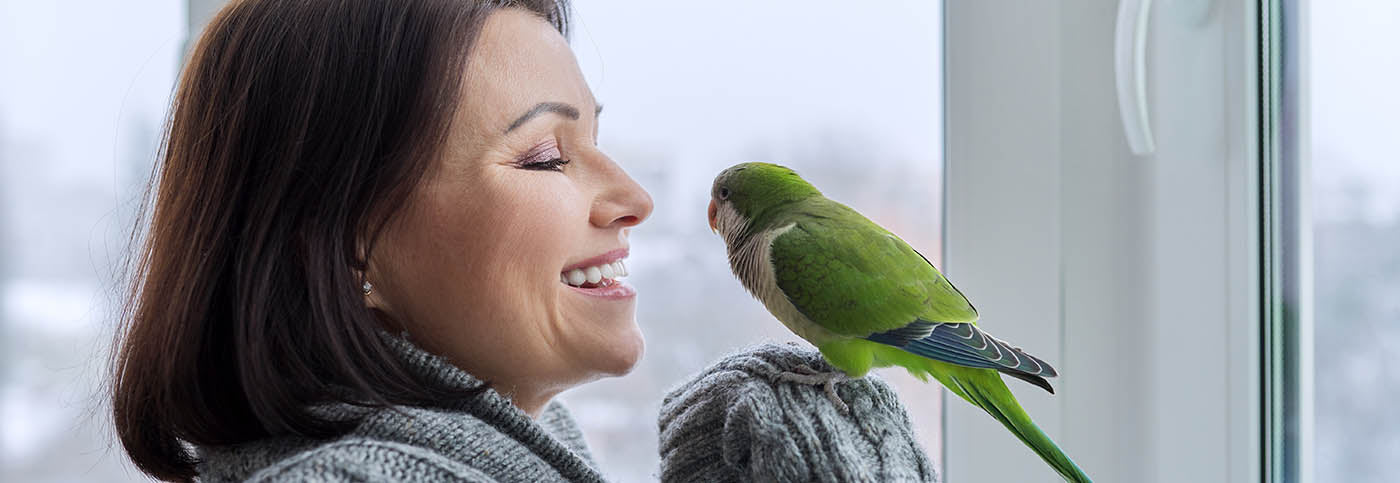Quaker parrots or Monk parakeets are pet birds cherished for their vibrant personalities and engaging behaviors. They are in the top three of my favorite advanced bird species (which include Senegal parrots and Green-Winged Macaws). In my experience, Green-Winged Macaws are the most chill species of macaws, a large bird but very trusting. The Senegal parrots are the clowns of the lot, silly and entertaining. Quakers are my favorite of the three; because of their attitude and vocalizations. They are honest and will tell you exactly how they feel. I have one as a family member; for example, he vocalizes his displeasure to me to grab my attention, to make me pay attention to him, and often; dips his foot into his water dish to let me know he wants to take a bath. They can be excellent communicators if you know what to look for.
To ensure the well-being and happiness of your feathered friend, you will need to provide them with proper care, including a balanced diet, suitable toys, treats, and essential supplies.
A nutritious diet is the cornerstone of a healthy Quaker parrot. Offer a variety of fresh fruits, vegetables, and high-quality pellet or seed mixes. Aim for a balance of 60-70% pellets, 20-30% fresh produce, and only 10% seeds. Fruits like apples, bananas, and berries, with leafy greens like spinach and kale, are excellent choices. Ensure that the food is washed and free from pesticides, you never know where that food has been, and even tiny amounts of contaminants can be very harmful. Never be too careful.
Quaker parrots are intelligent and playful birds, so providing them with various stimulating toys is essential. Choose toys that encourage mental and physical engagement, such as puzzles, swings, ropes, and shreddable toys. Rotate toys regularly to prevent boredom and keep their environment fresh and exciting. You will need to keep them engaged! Boredom for them is like depression for us; they can withdraw and take on negative behaviors such as feather picking/plucking.
They are social creatures that thrive on interaction. Spend quality time with your parrot daily, engaging in activities like talking, singing, and gentle training sessions. These interactions will strengthen your bond and contribute to your pet parrot's overall mental well-being.
Treats should be offered sparingly and as a supplement to their regular diet. Offer small portions of nuts like almonds and walnuts, whole-grain crackers, and cooked pasta. Avoid sugary or salty treats, as they can lead to health issues.
Maintain a clean environment for your Quaker parrot. Clean their cage regularly, removing uneaten food, droppings, and soiled bedding. Provide fresh water daily and clean food dishes to prevent bacterial growth. Most Quakers have a strong habit of washing their seeds before they eat them; you will sometimes need to freshen their water twice a day.
Typically you would want a cage for housing birds with horizontal bars to allow them to climb and make the most use of their cage. Quakers are highly adaptable and can climb vertical and horizontal bars with ease. Select a spacious bird cage to allow your parrot to climb and exercise. Their enclosure should be equipped with various perches of different diameters to promote foot health. Include natural wood perches to help trim their nails and beaks naturally. Foot health is vital as improper care can lead to a condition called bumblefoot which can make their day-to-day activities problematic.
Regularly inspect your pet parrot's feathers, beak, and feet for any signs of injury or abnormalities. Quaker parrots are known for their active personalities, which may lead to feather plucking if they become stressed or bored. Consult an avian veterinarian for routine health check-ups.
I am lucky with my Quaker, Mulligan. Mulligan is far quieter than I was expecting with his vocalizations. Quaker parrots are known for their vocal nature, be prepared for their enthusiastic calls and mimicry. If noise is a concern, consider providing a quiet space for them during nighttime hours. Ensure they are not near drafts, direct sunlight, and toxic fumes. A cage cover makes for an excellent nighttime ritual providing your bird with a consistent schedule.
Caring for Quaker Parrots requires attention, dedication, and a commitment to providing a stimulating and safe environment. By offering a balanced diet, engaging toys, social interaction, and regular health checks, you'll be rewarded with the companionship and joy these charismatic birds bring into your life.
|
Mulligan is Ken's friend and beloved Quaker Parrot. Ken started working with Petland in October 1997 and has worked in every position in the store over the years. He has had many pets throughout his life, from fresh and saltwater fish to reptiles, dogs, cats, and many others, and values pet-owner relationships. |




